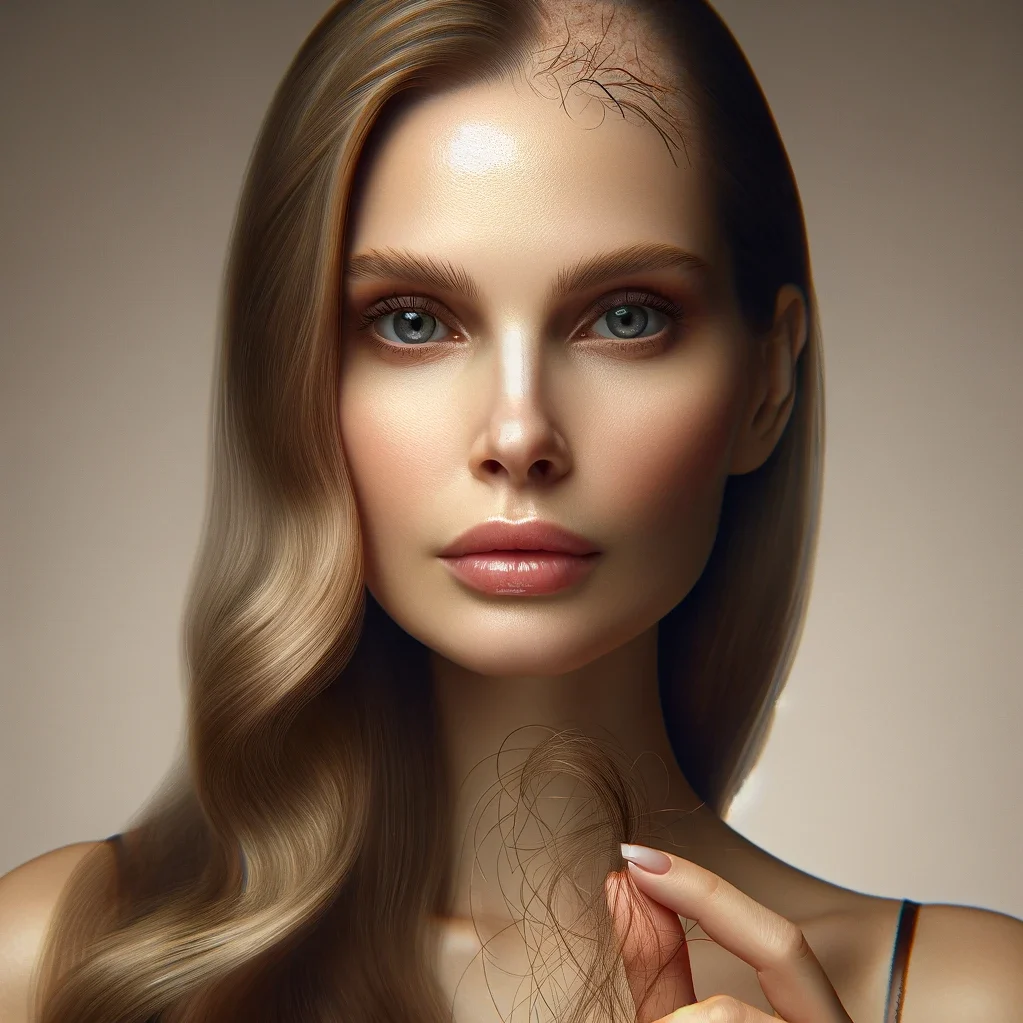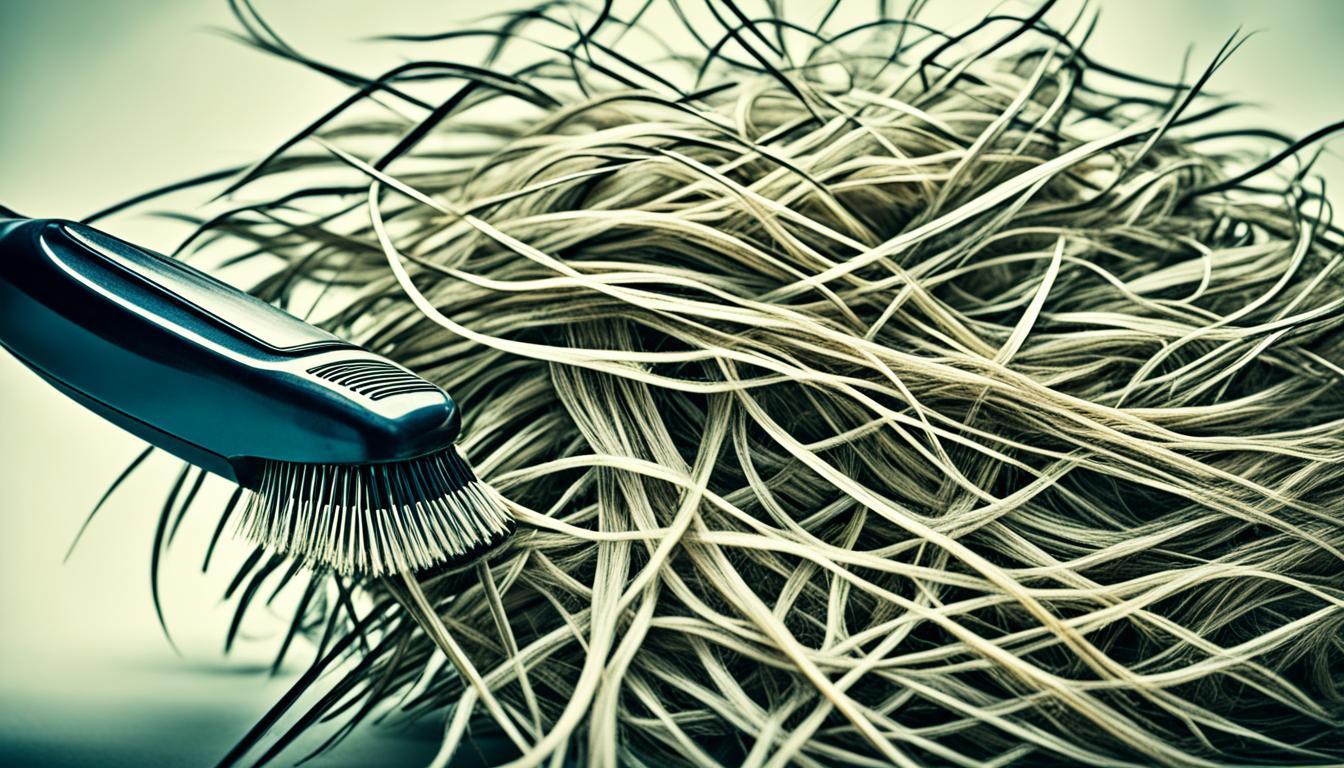Hair shedding is a common occurrence, with the average person losing 50 to 100 strands of hair per day. However, when hair shedding becomes excessive, it may be a cause for concern. According to trichologist Gretchen Friese, there are multiple factors that can contribute to hair shedding, including hormonal changes, diet, medication, illness, stress, and genetics.
In 2021, there has been an increase in female hair loss, particularly a type of temporary hair loss called telogen effluvium. This condition is often triggered by spikes in stress hormones and can result in excessive hair shedding. It is important to note that telogen effluvium is temporary, and recovery typically begins within three to six months.
It is essential to identify the underlying causes of hair shedding in order to find effective treatments and natural remedies to manage hair loss and promote regrowth.
Key Takeaways:
- Normal hair shedding is considered to be around 50 to 100 strands per day.
- Excessive hair shedding can be caused by multiple factors, including hormonal changes, diet, medication, illness, stress, and genetics.
- Temporary hair loss called telogen effluvium is common among women and can be triggered by stress hormones.
- Recovery from telogen effluvium typically begins within three to six months.
- Identifying the underlying causes of hair shedding is crucial to finding effective treatments and natural remedies for managing hair loss.
Signs of Excessive Hair Shedding
To determine if hair shedding is excessive, it is important to look for visible signs and changes in hair thickness. Trichologist Gretchen Friese suggests that if you notice your hair tie wrapping around your ponytail more times than usual or if your ponytail feels smaller in your hands, it may be a sign that your hair is thinning. Additionally, pay attention to the width of your part; if you start to see more scalp than usual, it could indicate hair loss. Women are less likely to experience a receding hairline and are more prone to overall thinning. However, a receding hairline can occur due to traction alopecia, which is caused by wearing tight hairstyles.
Other signs of excessive hair shedding include a noticeable decrease in hair volume and finding more hair in your brush, shower drain, or around the house. If you experience these signs, it may be time to seek professional help and explore treatments (Table 1) and remedies to address the excessive hair shedding.
| Treatment Options | Description |
|---|---|
| Nutritional supplements | Address nutritional deficiencies that may contribute to hair shedding |
| Hormone therapy | Manage hormonal imbalances that can lead to hair loss |
| Topical products | Use over-the-counter shampoos, conditioners, and serums to promote hair growth |
| Medications | Prescription medications to treat underlying causes of hair shedding |
| Natural remedies | Implement lifestyle changes and use natural hair care products to support hair health |
“Excessive hair shedding can be distressing, but it’s important to consult a professional to determine the cause and explore appropriate treatment options.
By identifying the signs and seeking help, you can take control of your hair shedding and work towards promoting healthier hair growth. Remember, everyone’s experience with hair shedding is unique, and what works for one person may not work for another. Consulting a professional and exploring various treatment options (Table 1) can lead you towards finding the best solution for your hair shedding concerns.
Treatment Options for Hair Shedding
If you are concerned about hair shedding and hair loss, it is recommended to schedule an appointment with a dermatologist or hair loss specialist. They can help identify the exact cause of your hair shedding and provide personalized treatment options. Depending on the underlying cause, treatments can range from addressing nutritional deficiencies and hormone imbalances to using over-the-counter products and medications. It is important to address the root cause of hair shedding in order to achieve effective results.
In addition to professional treatments, there are also natural remedies that can help manage hair shedding. These include maintaining a healthy diet, practicing stress-reducing techniques, and using natural hair care products. A well-balanced diet rich in vitamins and minerals, especially iron, zinc, and biotin, can promote hair health and reduce shedding. Stress-reducing techniques such as meditation, yoga, and exercise can help optimize overall health and minimize hair loss.
Additionally, incorporating natural hair care products into your routine can provide nourishment and strengthen the hair follicles. Look for products that contain natural ingredients like aloe vera, rosemary, and coconut oil that can stimulate hair growth and reduce hair shedding. However, it is important to note that while over-the-counter treatments can be helpful, it is always best to consult with a medical professional first to rule out any internal issues and ensure the most appropriate treatment plan. Taking proactive steps to address hair shedding can lead to improved hair health and potentially prevent further hair loss.
FAQ
What causes excessive hair shedding?
Excessive hair shedding can be caused by factors such as hormonal changes, diet, medication, illness, stress, and genetics.
How can I tell if my hair shedding is excessive?
Look for signs such as a decrease in hair volume, noticeable thinning, seeing more scalp, and finding excessive hair in your brush or around the house.
When should I seek professional help for hair shedding?
If you are concerned about hair shedding, it is recommended to schedule an appointment with a dermatologist or hair loss specialist to identify the underlying cause and explore treatment options.
What treatments are available for hair shedding?
Depending on the cause, treatments can range from addressing nutritional deficiencies and hormone imbalances to using over-the-counter products and medications. Consulting with a medical professional is crucial to determine the most appropriate treatment plan.
Are there any natural remedies for hair shedding?
Yes, maintaining a healthy diet, practicing stress-reducing techniques, and using natural hair care products can help manage hair shedding. However, it is always best to consult with a medical professional first to rule out any internal issues.

